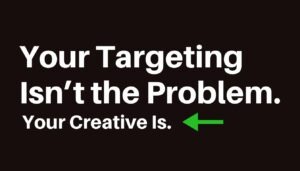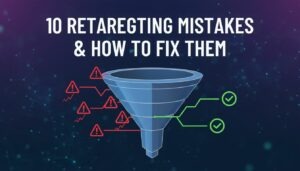If there’s one thing we hear on every discovery call, it’s this, “Our last agency promised the world and delivered nothing.”
Business owners often come to us burned out, frustrated, and skeptical. They’ve been through the agency nightmare. The one where you pay monthly retainers for vague “optimization” while watching your ad spend go to waste. Or worse, they get ghosted.
It can scale your revenue, free up your time to focus on what you do best, and actually move the needle on growth. The wrong one can set you back months. The wrong one can set you back months.
As a digital marketing agency, we’ve seen the same mistakes destroy client-agency relationships over and over. The worst part? Most of these disasters could’ve been avoided if business owners knew what red flags to watch for during the selection process.
If you’ve been here before, fear not! We’re here to help change the reputation digital marketing agencies carry by helping you avoid the top mistakes most business owners make when hiring an agency. Here are the red flags to watch for before you sign the dotted line on your next contract (or e-sign it).
1. Not Knowing What You Need

Here’s a conversation we have way too often:
“What are your goals?”
“Um… more sales?”
“From what channel?”
“All of them?”
If you don’t know what you actually need, you’ll end up with an agency that’s great at the thing you don’t need. It’s like hiring a heart surgeon when you need a dentist—they’re both doctors, but very different specialists.
Some agencies crush it with Google Ads but couldn’t write engaging content to save their lives. Others are content marketing wizards who have no clue how to run Facebook campaigns. If your goal is “more sales” and you hire an SEO agency, you’ll be waiting 6 months for results when you needed customers last month.
How to avoid this common mistake: Get specific about what you want. Instead of “more leads,” try “30 qualified leads per month from Google Ads within 90 days.” This helps you find agencies that specialize in what you need AND gives them a clear target to hit. Win-win!
2. Choosing Based on Price Alone
“We found this agency that’ll do everything for $500 a month!”
Sure, and you can probably find someone to fix your roof for $200. How do you think that’s going to work out?
Cheap agencies are cheap for a reason. They’re either inexperienced, overwhelmed with too many clients, or using your business as a testing ground for strategies they’ve never proven. You’ll get cookie-cutter campaigns, offshore team members who don’t understand your market, and “optimization” that consists of changing your ad copy once a month.
The hidden costs of discount agencies add up fast. While you’re paying $500/month for mediocre results, your competitors are scaling with agencies that know what they’re doing. Best to avoid at all costs (even small ones).
How to avoid this common mistake: Think ROI, not cost. An agency charging $3,000/month that generates $30,000 in new revenue is infinitely better than a $500/month agency that generates nothing. Ask about results, not just services.
3. Not Checking Their Track Record
Would you hire a contractor without looking at their previous work? Of course not! Yet many businesses hire agencies without reviewing past results, case studies, or client testimonials.
Speaking of case studies…theyr’e great (when they show the full picture). But too many businesses get impressed by flashy graphics and big percentage increases without asking the important questions.
“We increased revenue by 200%!” sounds amazing until you find out they went from $1,000 to $3,000 in revenue while spending $5,000 on ads. Or that “300% traffic increase” was from going from 100 to 400 visitors per month, still not enough to move the needle for most businesses.
Good agencies will show you the complete story: starting point, strategy, timeline, and actual business impact. They’ll explain what didn’t work, how they adjusted, and why their approach would apply to your situation.
How to avoid this common mistake: Ask for the full picture behind those case studies. What was the timeline? What was the total ad spend versus revenue generated? Are these results typical or their best-case scenario? Look for hard numbers that are difficult to manipulate such as ROAS, Cost Per Result, traffic increases, etc. Numbers speak louder than words, make sure you see them!
4. Falling for Big Promises Without Proof

“We guarantee first page rankings in 30 days!”
“Our secret system generates 500% ROI for everyone!”
“This strategy will make you the next viral sensation!”
Run. Just run. Or walk away…briskly.
Any agency making guarantees like this either doesn’t understand how digital marketing works or is flat-out lying to get your money. Google doesn’t care about their “special relationship” with the algorithm. Facebook doesn’t have a secret hack that only they know about.
Real marketing takes time, testing, and iteration. The agencies crushing it for their clients are the ones honest enough to say “We’ll test different approaches, optimize based on data, and expect to see meaningful results in 60-90 days” instead of promising unicorns and rainbows.
How to avoid this common mistake: Trust agencies that talk about testing, data, and realistic timelines. If they’re guaranteeing specific results before they even understand your business, they’re selling you a fantasy. Good agencies promise process and effort, not impossible outcomes.
5. Ignoring the Strategy Conversation
The agency that’s ready to start running your campaigns after a 20-minute discovery call is the same one that’ll waste your budget on generic strategies.
Real strategic partners are almost annoying with their questions. They want to know your profit margins, your sales process, your biggest competitors, what keeps you up at night, and why customers actually choose you over everyone else. They should challenge your assumptions and push back when your goals don’t make sense.
If an agency jumps straight into tactics without understanding your business model, they’re treating you like a template. You’ll get the same Facebook ad strategy they’re running for their SaaS client, even though you’re selling handmade jewelry to completely different audiences.
Strategic agencies understand that effective marketing starts with understanding the business, not the platforms.
How to avoid this common mistake: Look for agencies that want to understand your business deeply before they propose any tactics. If they’re not asking about your margins, customer journey, and competitive advantages, they’re just ad buyers, not strategic partners.
6. Not Understanding What They’re Actually Doing
Nothing screams “we have no idea what we’re doing” like an agency that drowns you in meaningless metrics and fancy terminology they can’t actually explain.
You know the reports: 47 pages of charts showing “brand lift awareness metrics” and “engagement velocity coefficients” while your actual sales stay flat. Or agencies that say things like “we’re optimizing for viewability optimization within our programmatic attribution modeling framework” when you just want to know if the ads are working.
If your agency can’t explain what they’re doing in terms your grandmother would understand, they’re either hiding poor results behind complicated language or they genuinely don’t understand their own strategy. Neither option is good for your business.
The best agencies explain things simply: “We tested three different ad angles, this one performed 40% better, so we’re shifting budget there and trying two new variations next week.”
How to avoid this common mistake: Demand clarity from day one. Ask them to explain their strategy like you’re a smart person who doesn’t speak marketing jargon. If they can’t do that, find someone who can.
7. Not Asking About Communication and Support
The agency that goes radio silent for three weeks, then sends you a one-line text saying “campaigns are performing well!” is the same one that’ll blame you for not hitting goals because you “weren’t engaged enough.”
Poor communication kills agency relationships faster than bad results. When you’re paying someone thousands of dollars a month, you shouldn’t have to wonder if they’re actually working on your account or if they’ve forgotten you exist.
Some agencies treat communication like an afterthought. You’ll get assigned to whoever has five minutes that week, bounced between different team members who don’t know your history, or stuck with someone who responds to urgent questions three days later with “let me circle back on that.”
Always lay the ground rules up front: know how often you’ll get updates, who your main contact will be, and how quickly they respond. Poor communication leads to frustration and missed opportunities.
How to avoid this common mistake: Pin down communication specifics before you sign anything. Who exactly will you talk to? How often? What happens if you need something urgently? If they’re vague about communication structure, they’ll be vague about everything else too.
8. Not Aligning on Tools and Platforms
The agency that crushed it for your friend’s Shopify store might be completely lost trying to generate B2B leads for your SaaS company. Different business models need completely different strategies, and not all agencies understand this.
We’ve seen e-commerce specialists try to apply product-focused Instagram strategies to professional services firms. Or B2C agencies waste budget on LinkedIn ads for consumer products because “that’s where the budget went last quarter.” The platforms, messaging, sales cycles, and metrics are different.
Some agencies will take any client that pays their retainer, regardless of whether they actually know how to succeed in that space. They’ll figure it out with your money, using your business as their learning laboratory.
How to avoid this common mistake: Ask for specific examples of success in your industry and business model. Don’t just look for similar company size, look for similar sales processes, customer types, and revenue models. An agency that’s killed it for local restaurants probably isn’t your best bet for technical consulting services.
9. Not Thinking About Long-Term Partnership
Hiring an agency for a quick three-month campaign and expecting them to revolutionize your business is like expecting a personal trainer to get you in shape after two gym sessions.
Real digital marketing success comes from understanding your audience, testing different approaches, and continuously optimizing based on data. That takes time. The agencies that deliver transformational results are the ones that stick around long enough to learn what works for your specific business and audience.
When you’re constantly switching agencies every few months, you’re starting over each time. New agency, new learning curve, new mistakes with your budget while they figure out what the last agency should have already discovered.
The businesses seeing 10x growth from their marketing aren’t the ones jumping from agency to agency chasing quick wins. They’re the ones that found the right partner and committed to the relationship long enough to see compound results.
How to avoid this common mistake: Think partnership, not project. Look for agencies interested in understanding your long-term business goals, not just this quarter’s campaign objectives. The best agencies want to grow with you, not just complete a task list.
10. Skipping the Onboarding Process
The agency that says “just send us your login credentials and we’ll get started” is about to waste weeks of your time and budget figuring out basics they should have learned upfront.
Proper onboarding is where agencies learn how your business works. What’s your profit margin on different products? How long is your sales cycle? Which customers are most valuable? What messaging has worked (or failed) in the past?
This is where you set expectations, define goals, share brand assets, and align on KPIs.
Agencies that rush to start campaigns without understanding your business fundamentals are essentially gambling with your budget while they learn on the job.
How to avoid this common mistake: Insist on a thorough onboarding process that covers your business model, customer data, past marketing performance, and specific goals. Ask how the onboarding process works. Make sure there’s a clear roadmap for the first 30, 60, and 90 days.
Your Next Move
Finding the right agency partner shouldn’t feel like rolling the dice with your business growth. The horror stories are real, but so are the success stories from businesses that found agencies who know what they’re doing.
The agencies worth your time and money will welcome these tough questions. They’ll be transparent about their process, honest about timelines, and genuinely interested in understanding your business before they start spending your budget.
If an agency gets defensive when you ask for specifics, pushes back on transparency, or tries to rush you into signing, that tells you everything you need to know about how they’ll handle your account.
Ready to find an agency partner that delivers results? The Digital Time Savers team believes in earning your trust through transparency, results, and genuine partnership. If you’re tired of agencies that overpromise and underdeliver, let’s talk about what real growth looks like for your business.
FAQ
What should I ask a digital marketing agency before hiring them?
Ask about their experience with your industry, case studies, how they measure success, and what the first 90 days will look like.
How do I know if an agency is the right fit?
They should ask smart questions about your business, share relevant examples, communicate clearly, and align with your values and goals.
Is it better to hire a niche agency or a generalist?
It depends on your needs. A niche agency may understand your audience better, while a generalist might offer a wider range of services.
Can I switch agencies if I’m unhappy?
Yes. If you’re not seeing results or communication is poor, it’s okay to move on. Just make sure you have access to your data and accounts.
How much should I expect to spend on a digital marketing agency?
It varies by service and experience, but a good agency will help you understand where your money is going and what results you can expect.















